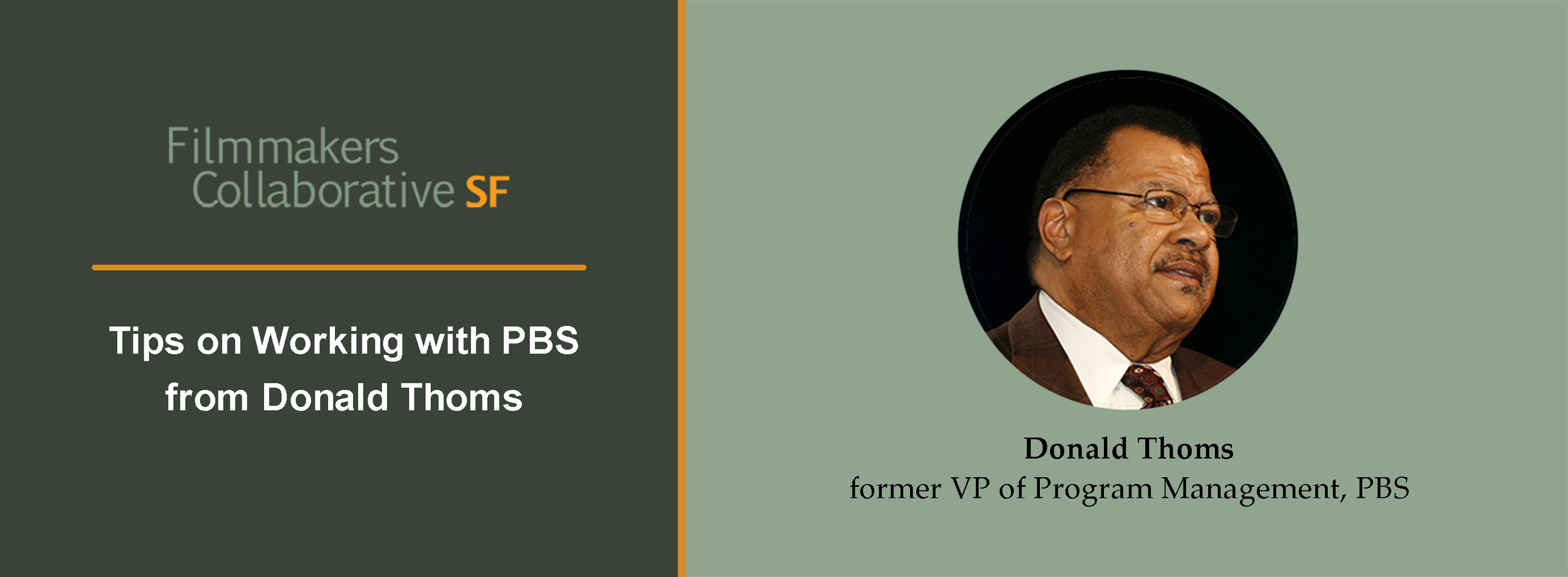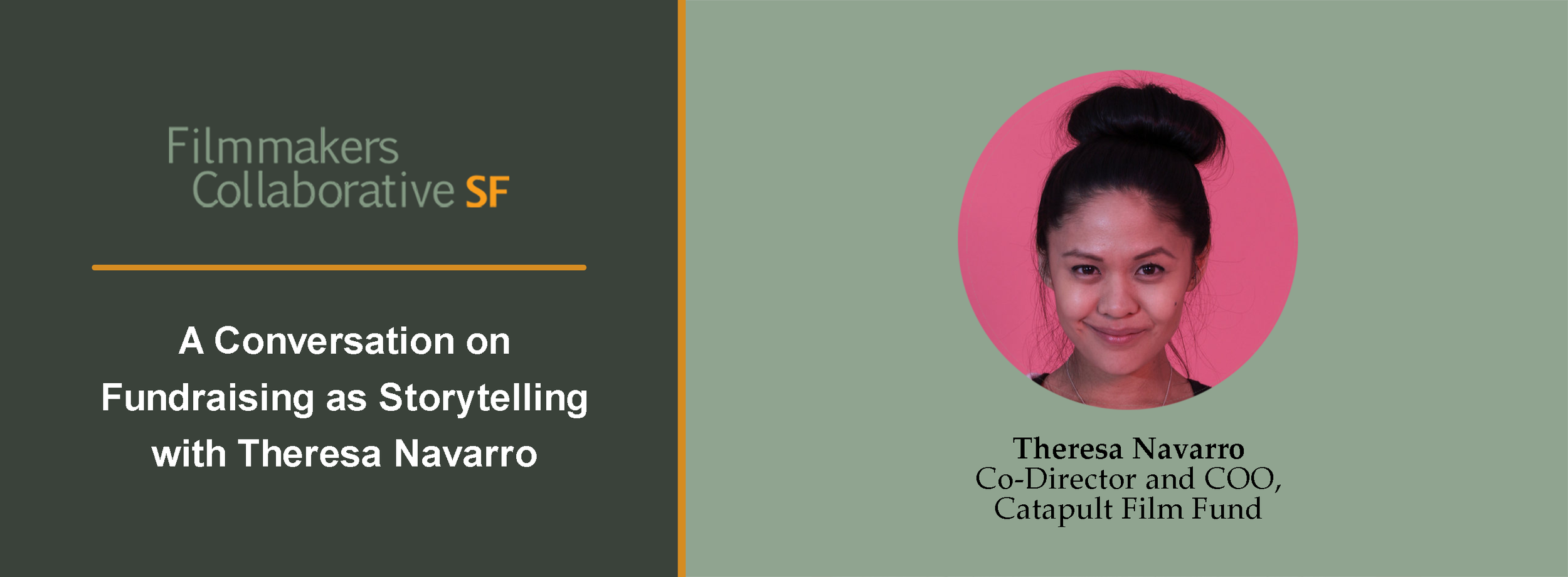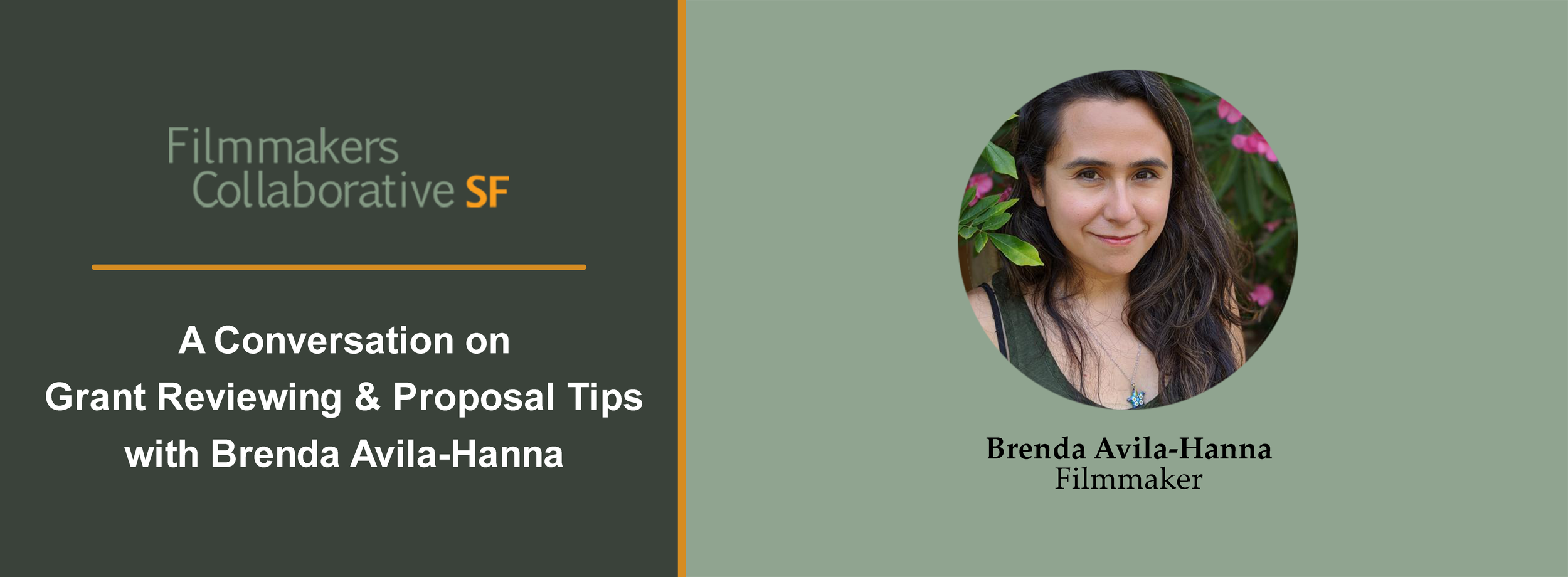A Conversation on Fundraising as Storytelling
with Theresa Navarro
“Filmmakers see filmmaking as storytelling and fundraising is also a mode of storytelling. You have to know who your audience is. You have to know your messages.”
- Theresa Navarro, Catapult Film Fund
We spoke with Theresa Navarro, Co-Director and Chief Operations Officer of Catapult Film Fund, about how filmmakers can improve their chances with fundraising and about her journey into the film industry as a first-generation cultural worker from a family of Filipino immigrants.
Are you approaching fundraising with the right mindset? Here are Theresa’s helpful insights!
How did you find your way into filmmaking?
I always start by saying that I didn't go to film school to uplift the different journeys that folks take to get here. My background is in history and ethnic studies, and later American Studies with a focus on museums, so my interest was in the places and platforms where "we" tell and reinforce stories about ourselves. I grew up in a large Filipino family that immigrated during the first Marcos regime in the 1980s, and that informed my worldview and relationship to media in general. Filipino culture is often described as 500 years in the convent under Spanish colonization, and 50 years in Hollywood under American occupation.
Films, particularly American films and musicals, played a huge role in my household. I remember my grandfather ordering VHS tapes from catalogs and keeping them in pristine condition with the plastic wrap intact. Moviewatching was an intergenerational and immersive experience, a collective escape from what I'd thought of as our more provincial life. At the same time, I feel really fortunate because I grew up in a very diverse, immigrant community with access to video stores, ethnic theaters, churches, and community groups that celebrated our culture and history. I didn't grow up lacking representation on screen, so that allowed me to move through the world with confidence that I was enough – and that my community had my back.
When I returned to the Bay Area after college, I started working with organizations like the Center for Asian American Media. It was a chance to facilitate experiences where communities could have stories that were for, by, and about them. It was my version of community-powered film school, where I was exposed to cinema from Asian auteurs like Apichatpong Weerasethakul and Hong Sang-soo alongside rising independent talent like Tze Chun, Ramona Diaz, Jennifer Phang, HP Mendoza, and Rich Wong. I come from the bootleg DVD generation, before you could access cinema streaming on Criterion or Mubi. This was before Netflix was even doing DVDs!
How has your background and your identity as a first-generation cultural worker influenced your work?
My father comes from a generation of Filipino overseas laborers, then worked graveyard shifts here in the states, so my early concept of work was associated with sacrifice. Many first generation cultural workers, especially from similar class backgrounds to mine, feel they have to justify career choices that "validate" their family's struggles to provide. It’s possible for folks to make a living doing meaningful work in this industry but imposter syndrome kicks in when you observe the way privilege and pedigree influence opportunities, whether it’s exclusive film school networks or cultural capital and connections from intergenerational wealth.
It does feel more accessible than it did 20, 30 years ago for folks from the communities that I identify with. I arrived during this interesting inflection point, between analog and digital as well as the emergence of an Asian American indie aesthetic. In the Bay Area, this was really informed by political movements like the Third World Liberation Front so many of us see it as our responsibility to disrupt. It's not enough for there to be more people who look like us onscreen if those stories are not challenging problematic narratives.
Can you tell us more about Catapult Film Fund? What does Catapult look for in projects?
Catapult is a San Francisco based nonprofit and our mission is to support nonfiction filmmakers with critical early stage funding and mentorship to launch distinctive story-driven and cinematic films. We were founded in 2010 and stand apart as one of few organizations that are exclusively focused on early stage support. Since then, we've distributed over $5.5 million in direct grants to filmmakers to over 250 film teams around the world.
I joined last fall but have been a fan of this organization for a long time because of its reputation in the field for being the first supporter for many filmmakers and films I know and love. I started to notice Catapult as a force behind some of my favorite films when I was attending a film festival or later when I was with the PBS series ‘POV’–films that people can’t stop thinking or talking about. It’s great to be there at the beginning and be the first vote of confidence to help a filmmaker along their way so that they have the resources to get their projects started properly.
What are some of your favorite films that Catapult has supported?
There are so many! There are high profile titles like Oscar-nominated All That Breathes and Crip Camp, as well as Oscar winner American Factory from Steven Bognar and the late great Julia Reichert. And there are other films that stay with me, like David Osit's Mayor, Kirsten Johnson's Cameraperson, and Loira Limbal's Through The Night, because they draw you in and make you really think about the world differently. That offer truly cinematic experiences that remind us of our shared humanity.
What is your advice for filmmakers who are trying to understand how to position their story for fundraising?
One of the frameworks that I think is important when thinking about fundraising, specifically for independent filmmakers that come from underrepresented communities, is the idea that fundraising is persuasive storytelling. Filmmakers see filmmaking as storytelling and fundraising is also a mode of storytelling.
You have to know who your audience is. You have to know your messages. The two questions I would offer are “Why this film now?” and “Why you?” You should be able to answer those two questions persuasively and be able to clearly visualize who you’re presenting this case for support to and the best way to reach them. I need to know what makes this particular project a “must support” and a “must see.” Some folks worry that if it's not trending or in the headlines, interest wanes, but you always have to be the #1 advocate for the viability of your film.
What is a common misconception that filmmakers have when it comes to fundraising?
You should think about fundraising the same way you think about production and distribution, with a team and timelines. It's important to understand the business aspect if you want to pursue a career in this field versus filmmaking as a hobby.
In fundraising, people give to people. They're investing in you and the belief that you have the wherewithal to get this film done. The industry is a network of complicated relationships and it’s important to value the relational over the transactional, especially when you’re raising money in community fundraising. Each fundraising encounter is relationship management and relationship building. Even if someone doesn’t fund your film now, maybe they will be rooting for you or follow you to your next project.
Part of fundraising is understanding your film and what makes it unique. After that, the long part of it is the stewardship of the relationship. It's the updates along the way. It's amplifying supporters to be ambassadors and share your project with their network.
You also need to identify and prospect your funders properly. If you have a series and you go to a funder who doesn’t support series, then you’re wasting their time and it’s clear to them that you haven’t read the guidelines.
Any other advice for filmmakers?
There are so many different platforms to tell stories these days, so it's important to be clear what makes your story a film and not a podcast or a viral video. What makes this project essential to be told cinematically? Paint me the picture of what the scenes are going to look like. How is the camera going to move? How are you going to use sound? How are you using time in your film and orienting people to the scope of the content?
We read every application multiple times and that's true for most of our peers in the field. The ones that stand out are able to articulate what makes their project irresistible, so that when a funder is reading it, they think they have to support it right now. The writing you do for fundraising is different from marketing because it’s about getting someone to support your film, not just watch it.
What are your thoughts about the future of this industry? Are you hopeful?
There is so much talent and artistry out there. And there is more open dialogue around ethics and accountability, with folks trying to figure out meaningful interventions that we can make so we're not just doing the same thing and expecting different results. And there are conversations and resources shifting in different places that are in turn sparking new stories and inspiring new storytellers. All of these things make me feel really hopeful.
I think there's a lot of potential for an industry that is better and more equitable than what we've experienced before. When there are these challenges that we’re experiencing as a community of filmmakers, as in this particular generation’s experience, that’s when creative solutions must arise.
That's why it's important to have spaces like Filmmakers Collaborative SF, to help foster networks and sustain filmmaker spirits when things get tough. Being able to attend festivals and events where I can reconnect with beloved colleagues in person is really beautiful. There are so many people and organizations who took a chance on me and I hope to pay that forward whenever I can. That feeling of community support and being seen is what allows people to really thrive in this field.




